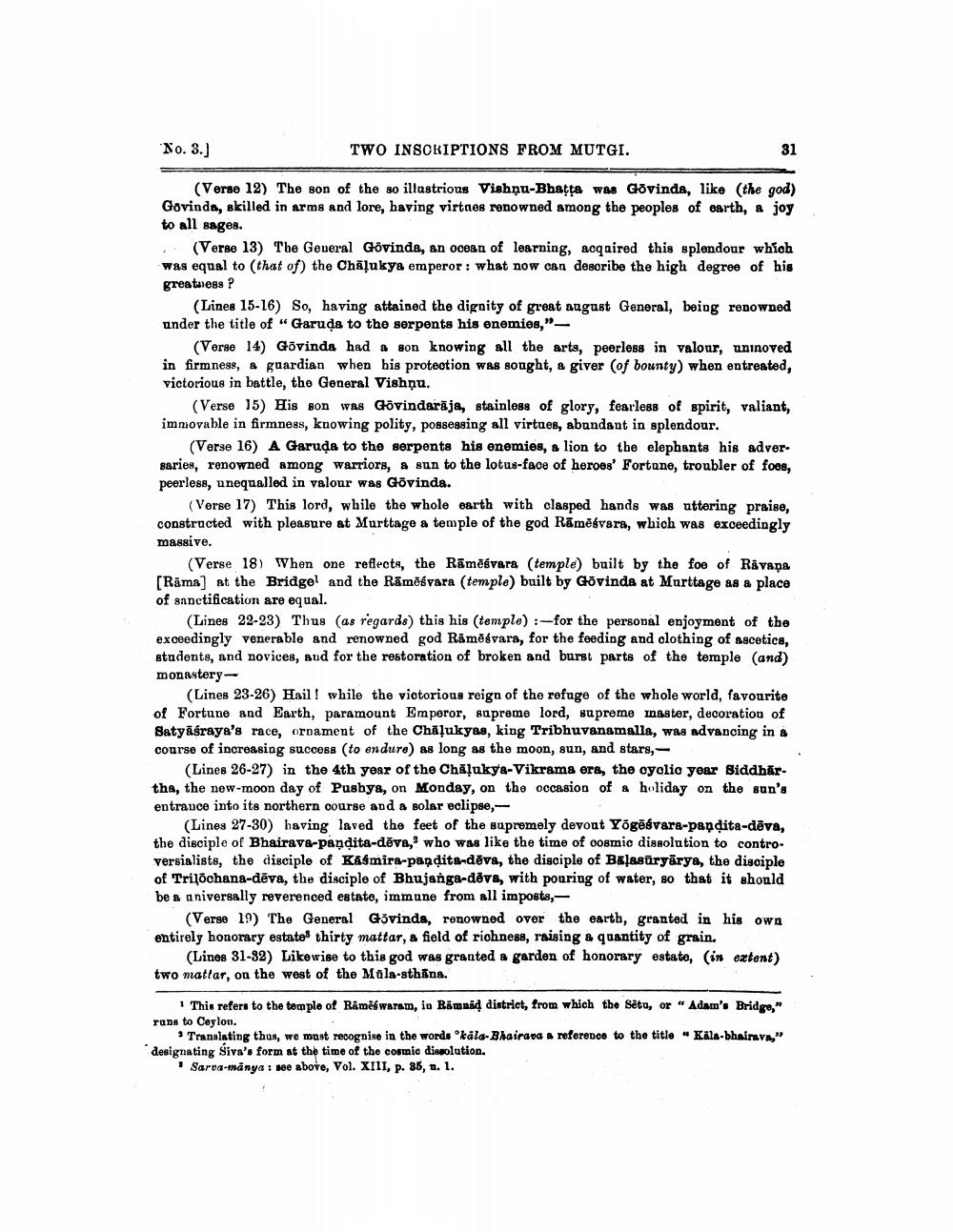________________
No. 3.]
TWO INSCRIPTIONS FROM MUTGI.
(Verse 12) The son of the so illustrious Vishnu-Bhaṭṭa was Govinda, like (the god) Govinda, skilled in arms and lore, having virtues renowned among the peoples of earth, a joy to all sages.
31
(Verse 13) The General Govinda, an ocean of learning, acquired this splendour which was equal to (that of) the Chalukya emperor: what now can describe the high degree of his greatness ?
(Lines 15-16) So, having attained the dignity of great august General, being renowned under the title of "Garuda to the serpents his enemies,❞—
(Verse 14) Govinda had a son knowing all the arts, peerless in valour, uninoved in firmness, a guardian when his protection was sought, a giver (of bounty) when entreated, victorious in battle, the General Vishņu.
(Verse 15) His son was Govindaraja, stainless of glory, fearless of spirit, valiant, immovable in firmness, knowing polity, possessing all virtues, abundant in splendour.
(Verse 16) A Garuda to the serpents his enemies, a lion to the elephants his adversaries, renowned among warriors, a sun to the lotus-face of heroes' Fortune, troubler of foes, peerless, unequalled in valour was Govinda.
(Verse 17) This lord, while the whole earth with clasped hands was uttering praise, constructed with pleasure at Murttage a temple of the god Ramesvara, which was exceedingly
massive.
(Verse 18) When one reflects, the Rāmēsvara (temple) built by the foe of Rāvana [Rama] at the Bridgel and the Ramesvara (temple) built by Govinda at Murttage as a place of sanctification are equal.
(Lines 22-23) Thus (as regards) this his (temple) :-for the personal enjoyment of the exceedingly venerable and renowned god Ramesvara, for the feeding and clothing of ascetics, students, and novices, and for the restoration of broken and burst parts of the temple (and) monastery
(Lines 23-26) Hail! while the victorious reign of the refuge of the whole world, favourite of Fortune and Earth, paramount Emperor, supreme lord, supreme master, decoration of Satyasraya's race, ornament of the Chalukyas, king Tribhuvanamalla, was advancing in a course of increasing success (to endure) as long as the moon, sun, and stars,
(Lines 26-27) in the 4th year of the Chalukya-Vikrama era, the cyclic year Siddhartha, the new-moon day of Pushya, on Monday, on the occasion of a holiday on the sun's entrance into its northern course and a solar eclipse,
(Lines 27-30) having laved the feet of the supremely devont Yōgesvara-pandita-dēva, the disciple of Bhairava-pandita-dēva, who was like the time of cosmic dissolution to controversialists, the disciple of Kasmira-paṇḍita-dēva, the disciple of Balasuryārya, the disciple of Trilochana-dēva, the disciple of Bhujanga-deva, with pouring of water, so that it should be a universally reverenced estate, immune from all imposts,
(Verse 1) The General Govinda, renowned over the earth, granted in his own entirely honorary estates thirty mattar, a field of richness, raising a quantity of grain.
(Lines 31-32) Likewise to this god was granted a garden of honorary estate, (in extent) two mattar, on the west of the Mala-sthāna.
1 This refers to the temple of Rameswaram, in Bamaad district, from which the Sētu, or " Adam's Bridge," runs to Ceylon.
* Translating thus, we must recognise in the words "kala-Bhairava a reference to the title "Kala-bhairava," designating Siva's form at the time of the cosmic dissolution.
Sarva-manya: see above, Vol. XIII, p. 35, n. 1.




